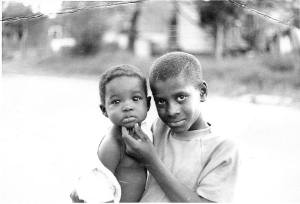
Rochelle was going to meet me at my house for an interview at 9:30 a.m. First she had to drop her kids off at school and buy a tire for her car. Nothing goes smoothly in Rochelle’s life so I expected I would hear from her telling me she would be late. She texted me at 9:00. She would be an hour late. She texted me slightly before 10:30 and spilled out the more complicated problem: She had bought a tire the day before, but it was “messed up,” so she had gone back to the tire store to get it replaced. I suspected it was even more complicated than that, and it was. She had bought a used tire. The store did not have another used tire to replace the defective one, and she didn’t have enough money for a new tire. She asked me if I knew any place to buy tires. I did, however I buy new tires. I suggested we meet at a Goodyear tire store near my house. That was about a twenty-minute drive from where she was.
This is a blog about poverty. The real tire problem was that though Rochelle badly needed a tire, she couldn’t afford one. Her solution was to buy a used tire from a store she had never dealt with before. The price of the “messed up” used tire had been $75. Rochelle met me at the Goodyear store. She had been refunded her $75, but a new tire was going to cost $165, inclusive of labor and tax. Rochelle didn’t have that much money. I said I could give her $60 for that day’s interview and the next interview, but she would still be $30 short. Rochelle had recently had her thirty-eighth birthday. I decided I would make up the $30 and call it her birthday present. The tire problem for today was solved. That was problem #1 of the day.
The next question, problem #2, was when would the car be ready. Rochelle had to pick up her fourteen year old daughter from school at 3:30. The car would be ready “by the end of the day,” said the Goodyear employee. The car wasn’t ready until slightly after closing. By then it was rush hour. What was a twenty-minute drive without traffic became a forty-five minute drive and the daughter had already been waiting at the school for two hours. I could have driven Rochelle to pick up her daughter at 3:30, but then it was questionable if we could get back to the tire store before closing. Then Rochelle would have no car to transport her children to school and herself to work the next day. So I decided it was better to wait until the car was ready before picking up the daughter. Rochelle’s daughter could watch her brother practice for that evening’s school football game. So her daughter had to wait, which upset Rochelle, but she finally had a new tire.
Rochelle’s life isn’t easy. Everyone hates buying tires. They are expensive and some people can’t afford them. For that reason there is a market for used tires. They can be safe to buy if you know and trust the dealer, but buying them can be dangerous if you don’t. There are also tire rental stores for people who just want to have their car pass the required state safety inspection. Poverty presents problems on a daily basis that many people aren’t even aware of. This is Rochelle’s life.









